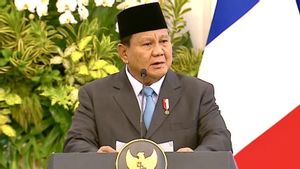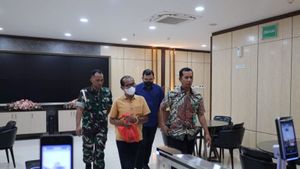JAKARTA - The Draft Law on Family Resilience which is included in the National Legislation Program has sparked debate in the community. This bill came about because it wants families in Indonesia to be in the ideal category.
One of the proposers was Netty Prasetiyani, a member of the House of Representatives of the Prosperous Justice Party (PKS). He explained that the emergence of this bill was due to the awareness that the family is coal in the carriage of civilization. He denied that when the bill was said to be aimed at intervening in household life.
According to Netty, not all families in Indonesia are in the welfare category, therefore with this bill, she wants Indonesian families to fall into the ideal category.
"So the state must provide access so that these families in various strata, in various dimensions, can have resilience," he said, at the DPR Building, Parliament Complex, Jakarta, Tuesday, February 18.
Netty said, referring to data from the BKKBN in 2015, 51.7 percent of family heads in Indonesia graduated from elementary school (SD). He was surprised by the pattern of family formation when the head of his family graduated from elementary school.
Therefore, with this bill, families will have immunity and resilience. The presence of this bill is not intended to intervene in the life of a family, including determining who is married to someone.
Furthermore, Netty explained, another reason for the formation of this bill is so that Indonesian families have the values of honesty and independence. That way, the family will have readiness to live the ark of their life.
"We want the family in any situation to be able to get out of the crisis and then that is done. The values of radicalism, which are dangerous, can be anticipated, can be prevented starting from the family. That's what we hope," he said.
Article controversy
There are 146 articles in the Family Resilience Bill. Some of the articles are disputed. Among them, sexual deviations, the wife's obligation to take care of the household and sperm matters.
In the elucidation chapter of the Bill on Family Resilience, a number of articles discuss sexual deviance, which in the explanation are attached to Lesbian, Gay, Transgender and Bisexual (LGBT), such as Articles 86 and 87.
Article 86 states: "Families experiencing a family crisis due to sexual deviations are obliged to report their family members to the agency that deals with family resilience or a rehabilitation institution appointed by the government for treatment and / or treatment."
Meanwhile, article 87 reads: "Every adult who experiences sexual deviation is obliged to report himself to the body that handles family resilience or a rehabilitation institution to get treatment and / or treatment."
Then a public debate occurred in Article 25 paragraph (3) which states the obligations that must be performed by a wife, namely: a. obliged to regulate household affairs as well as possible; b. keep the family together; Sertac. treat husbands and children well, and fulfill the rights of husbands and children according to religious norms, social ethics, and provisions of laws and regulations.
In addition to regulating sexual deviance, the Family Resilience Bill also regulates what can and cannot be done regarding the sperm and ovum of the Indonesian people. At least, there are four articles in the bill that regulate this matter.
Article 26 paragraph (1) states that a married couple has the right to reproduce. Then in paragraph (2) it is regulated that reproduction can be carried out naturally and using intermediary technology.
"Every husband and wife who are legally bound by a marriage have the right to obtain offspring as referred to in paragraph (1) letter c can be carried out by natural means or assisted reproductive technology by using the fertilized sperm and ovum from the husband and wife concerned and implanted in the wife's womb. where does the ovum come from, "the bill states.
Then, Article 31 of the Bill prohibits the practice of buying and selling sperm or ovum for the purpose of obtaining offspring. Paragraph (2) also prohibits any person from persuading, facilitating, coercing, and / or threatening other people to trade sperm or ovum.
The Family Resilience Bill also prepares fine and criminal sanctions for violators of these two things. Article 139 states that a person who trades sperm or ovum is subject to a maximum imprisonment of five years and a maximum fine of Rp. 500 million.
Not only that, this bill also penalizes people who deliberately persuade, facilitate, coerce, and / or threaten other people to trade sperm or ova. This rule is contained in article 140.
"... shall be punished with a maximum imprisonment of 7 (seven) years and a maximum fine of Rp. 500,000,000.00 (five hundred million rupiah)," Article 140 states.
In this bill, there are also rules regarding surrogation of the uterus or surrogate mother. The rules related to surrogation are contained in Article 32 of the draft Family Resilience Bill. Meanwhile, the rules for criminal sanctions are contained in articles 141, 142 and 143.
Article 32 paragraph (1) reads, "Everyone is prohibited from carrying out surrogation to obtain offspring." Meanwhile, paragraph (2) reads, "Everyone is prohibited from persuading, facilitating, coercing, and / or threatening other people to carry out surrogation to obtain offspring."
Then, Article 141 reads, "Any person who deliberately performs surrogation for the purpose of obtaining offspring as referred to in Article 32 paragraph (1) shall be punished with imprisonment of up to 5 (five) years and / or a maximum fine of Rp. 500,000,000. 00 (five hundred million rupiah). "
Then, Article 142 reads, "Any person who deliberately induces, facilitates, forces, and / or threatens another person to volunteer to carry out a surrogation as referred to in Article 32 paragraph (2) in order to obtain offspring, shall be punished with imprisonment of 7 (years). years and a maximum fine of Rp. 500,000,000.00 (five hundred million rupiah). "
Furthermore, Article 143 paragraph (1) reads, "In the event that the criminal offense as referred to in Article 31 and Article 32 is committed by a corporation, in addition to imprisonment and fines against its management, the punishment that can be imposed on the corporation is in the form of a maximum fine of 5,000,000,000. 00 (five billion rupiah). "
Then, paragraph (2) reads, In addition to the fine as referred to in paragraph (1), the corporation may be subject to additional penalties in the form of: a. revocation of business license; and / or b. revocation of legal entity status.
Member of Commission III Arsul Sani said that the issue of imprisonment like this should be synchronized with the Criminal Code Bill which is currently being discussed at Commission III. But according to him, the imprisonment sentence of the Draft Resilience can be replaced with a fine or social work.
"Yes, with the principle that the law is that the criminal provisions must be synchronized with the book of one Draft Criminal Code which will become the Criminal Code. Where, if an incident is considered a criminal event, it does not have to be imprisoned. supervision, "he explained.
The English, Chinese, Japanese, Arabic, and French versions are automatically generated by the AI. So there may still be inaccuracies in translating, please always see Indonesian as our main language. (system supported by DigitalSiber.id)













